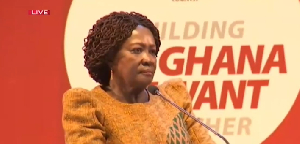Opinions of Saturday, 28 September 2013
Columnist: Okoampa-Ahoofe, Kwame
The Last Bow of an "Ewe" Tribal "Chauvinist"
By Kwame Okoampa-Ahoofe, Jr., Ph.D.
Elizabeth Ohene's BBC tribute to the late Prof. Kofi Nyidevu Awoonor makes for a quite fascinating reading (See "Kofi Awoonor: Remembering a Ghanaian Poet" 9/24/13). Still, I find it quite in order to gloss on a few more complementary comments, although I particularly did not care very much for the man or his literary corpus, which was neither as vast and qualitative as the works of such legends as Wole Soyinka, Chinua Achebe, Ngugi wa Thiong'o and, of course, Ghana's own Ayi Kwei Armah, a man who, like his Nigerian and Kenyan contemporaries, has been widely rumored to have been shortlisted for the Nobel Prize in Literature several times.
Soyinka would actually go down in global history as the first Black-African ever to win the Nobel Prize for Literature (1986). Soyinka's clinching of the Nobel Literature Prize was only a matter of time. I had always said before the award was afforded him, that if ever any continental African qualified to be the glorious recipient of the same, that personality, of course, was none other than Nigeria's Wole Soyinka. In fact, shortly after the Apex Literature Prize was awarded him, a white-American woman guest-lecturer to one of my creative writing classes at the City College of the City University of New York (CCNY of CUNY), I believe her name was Ms. Haddas, a poet, I forget her first name (she was then nursing her newly-born baby), had the misfortune of patronizingly asking me what I thought about the highest global literary prize being awarded to an African. I promptly riposted that it was long overdue, and that other far less talented and far, far less prolific and even far less versatile non-African litterateurs had already received the Nobel Literature Prize.
I don't think my creative writing teacher for that course, Ms. Karen Swenson, as I vividly recall, took kindly to my perceived rude and abrupt response, coming from a newly arrived African student with an accented lilt the thickness of charcoal. I would receive a precautionary letter-grade of a "B," for refusing to attend a party organized in her private residence for our class by Ms. Swenson. "Precautionary," because she had categorically warned that any student who failed to show up at her house would be academically disciplined.
Anyway, in her rather terse and limpid tribute to Prof. Awoonor, Ms. Ohene omits to inform her readers that the dropping of his European names of "George" and "Williams" was part of the 1960s "Nkrumah Revolution." For Prime Minister - later President - Francis Kofi-Nwia Kwame Nkrumah would drop his "Christian name" of "Francis" and simply style himself as "Kwame Nkrumah." It was, admittedly, a radical psycho-cultural epiphany of sorts, even though until the end of his life, Nkrumah adamantly insisted on being identified as a "Marxist-Christian" who envisaged no contradiction in this rather curious ideological compound.
Ms. Ohene is also quite right that Awoonor remarkably contributed to both the literary and dramaturgical ferment of the 1960s, but it is absolutely untrue that the slain poet had "assumed responsibility for the development of theater and drama in the country." The latter yeomanly credit actually belongs to two Cape Coasters roughly of the same age, namely, Ms. Efua Sutherland in whose Ghana Drama Studio (1958) Awoonor's drama troupe, the Ghana Playhouse, would be housed; and Mr. J. C. DeGraft (alias Joe DeGraft), who had expressly been transferred from the Mfantsipim School, where he headed the Language and Theater Department, by President Nkrumah, in order to found the erstwhile University of Ghana's School of Music and Drama.
I know quite well about the preceding, first-hand, because my own late father had been moved into Joe's office (Room 6), by Prof. J. H. Kwabena Nketia, then Director of the Institute of African Studies, when "Uncle Joe," as Joe DeGraft was affectionately called, was seconded by UNESCO to Kenya to establish a similar music and drama program at the University of Nairobi. My father, newly graduated from the School of Music and Drama, would also be named Technical Director at the same school, presently named the School for the Performing Arts.
We need to also highlight the fact that Awoonor owes a heavy debt of gratitude to Prof. Nketia for his work in neo-oral poetry, even though the much younger Ewe tribal poet pretended for most of his academic and professional life to have been autodidact. Needless to say, it was actually Prof. Nketia who patiently and meticulously mentored Awoonor, as well as tutored the latter, in the intricate art of musicology and oral poetry, the famous Director of the Institute of African Studies himself having been quite a knowledgeable and erudite cultural custodian and easily the best Ghanaian poet in both English and Akan of his generation (See W. E. Abraham's The Mind of Africa).
Ms. Ohene is also quite accurate to observe that "Kofi Awoonor joined [the 1980s Rawlings revolution] with all his feet and hands." But this was definitely not because "Kofi Awoonor did not know how to do anything in a half-hearted manner." Rather, it was primarily because Awoonor was an insufferably pathological social climber, to speak much less about a congenital opportunist. Prof. Nketia may not want to publicly admit this, but I authoritatively know that he thinks the same with irrefutable conviction. A tribal hegemonist, indeed, he was. And an inexcusably violent one at that. No two ways about that!
________________________________________________________
*Kwame Okoampa-Ahoofe, Jr., Ph.D.
Department of English
Nassau Community College of SUNY
Garden City, New York
Sept. 24, 2013
E-mail: okoampaahoofe@optimum.net
###
Entertainment











